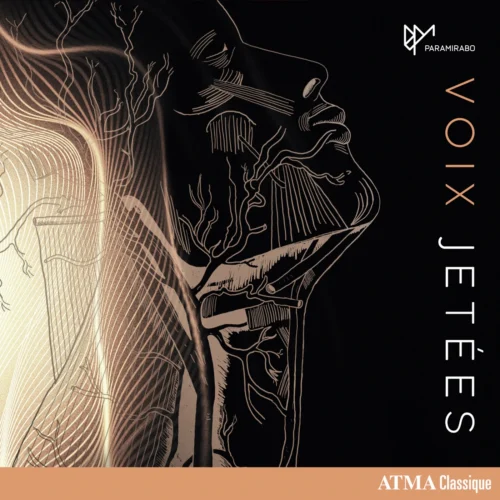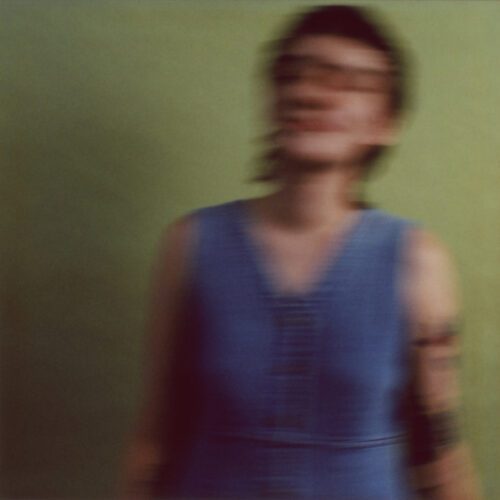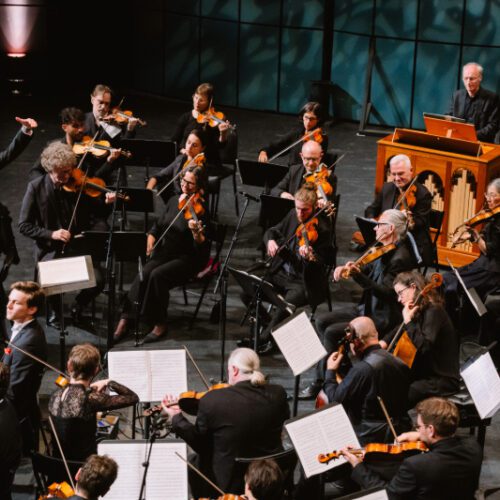The good thing about the post-minimalist movement is that it takes certain characteristic aspects of the American school launched by Riley, Reich, Glass, and others (propulsive rhythms, resolutely tonal harmonies, repeated motifs sometimes inducing trance), and superimposes a musical modernity based on atonalism, noise or other avant-garde techniques. We can also add elements drawn from popular music, non-Western scholarly music, alternative rock, electro/techno, and so on. In short, whereas the atonal avant-garde of the second half of the 20th century seemed to freeze into a haughty, purist posture, “Minimalism” remains entirely open to all possibilities of dialogue.
That’s exactly what this fine album by Montreal ensemble Paramirabo on the Atma label demonstrates. Assembling the five works on the program reveals the wide range of possibilities offered by post-minimalism, from a direct heritage of the original movement born in the 1960s to an almost abstract distillation of its codes.
Nico Muhly is the first composer to be invited here. He is also the one most directly linked to the original Minimalism, having worked with Philip Glass. The exciting pulse, bold colors, and tonal focus are immediately recognizable. That said, as a good post-minimalist, Muhly spices up his score here and there with rhythmic breaks and delicate, harmonically off-center digressions, making him a child of the 21st-century post rather than a pure minimalist. The result is a luminous and reasonably complex piece, as enjoyable to listen to as it is to play (we presume).
One of the most innovative composers on the contemporary scene, Missy Mazzoli (who came to Montreal for a concert at Salle Bourgie in February 2024 – READ MY REVIEW), second in order on this program, stretches the traditional codes of Minimalism with Still Life with Avalanche. The idea of an avalanche is embodied by a set of superimposed melodies that “spill out” and “collapse”, only to distort and disintegrate at the end of the piece. The pulse is intermittent, the harmonies hesitant, but the listening pleasure remains intact. This is agile, beautiful, and refined music, a brilliant example of post-minimalism at its best.
Montreal-based Keiko Devaux is, in my humble opinion, one of the most worthy members of the new creative generation in contemporary music, on a North American scale (and soon the world). Her modernity, richly rooted in solid studies (with Sciarrino, among others) and eclectic interests, is beautifully informed by narrative ease and attention to the aesthetic beauty of the final result. Voix jetées (‘’Thrown out voices’’) is an excerpt from her opera L’écoute du perdu (‘’The Listening of the Lost’’), premiered in 2023 in Montreal. Paramirabo is joined here by soprano Sarah Albu, another fine arrival on the recent contemporary music scene. Michaël Trahan’s text (Je jette ma voix par la fenêtre – ‘’I throw my voice out the window’’) brings us back to our emotional perception of sound, and the close relationships we infer to it in our minds. If this premise suggests an approach inspired by sound abstraction and a highly cerebral result, it’s nothing of the sort. Voix jetées lifts us up and holds us in a delicate yet strange weightlessness. A shifting carpet of minor chords, spiced with glissandos and atonal quiverings, supports Sarah Albu’s angelic, floating, even ethereal voice. Devaux’s writing is simply spellbinding, and the undeniable modernity of her pen is above all of great beauty. Minimalist mechanics are left aside in favor of simple but collectively elaborate elements. Magical.
In Music for Body-Without-Organs, we recognize everything that makes (also Montrealer) Nicole Lizée’s music so original and postmodern. The fusion of experimental atonality, insistent pulsation and consonant melodicism is activated in parallel with another fusional layer linked to extra-musical referents such as (in this case) science-fiction, horror films and Deleuzian philosophy. I defy you to find anyone else who would dare to do this and, above all, manage to draw from it an expression packed with vitality and stimuli for music lovers! Lizée succeeds brilliantly in this piece, whose continuous pulse is transformed by recurrent accelerations and decelerations. Clinging to the concept of the body without organs, a Deleuzian idea of fluidity and narrative/identitarian mutation married here with images of classic horror films evoked by the composer (Carnival of Souls from 1962, where ghouls dance demonic choreographies in a church to the sound of an organ), the music becomes metamorphic and as if in constant indecision as to its own posture. A brilliant encounter between (very) learned culture and (very) popular culture. Great Nicole Lizée stuff.
The program concludes with Leviathan by Canadian-American composer Jared Miller, which explores the idea of parallax, which deals with the difference in perception of the same object (or point), depending on the angle of view. Miller’s inspiration came from the songs of whales, which a human cannot hear in all their facets because certain frequencies are imperceptible to us. The way to access them is to increase their frequency by several octaves, thus changing the ‘point of hearing’’. Thus “transcribed” and enhanced in a narrative/emotional arch construction, these strange but fascinating melodies become a contemporary hymn to the discovery and appreciation of difference. Lovely.
Superb album of some very new, intelligent and attractive music. Do not miss it.
























